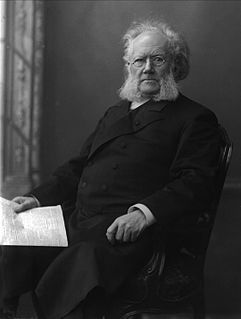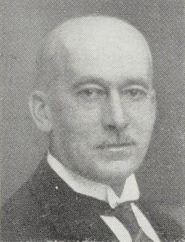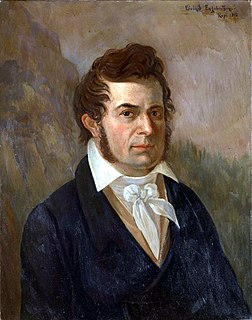
Henrik Johan Ibsen was a Norwegian playwright and theatre director. As one of the founders of modernism in theatre, Ibsen is often referred to as "the father of realism" and one of the most influential playwrights of his time. His major works include Brand, Peer Gynt, An Enemy of the People, Emperor and Galilean, A Doll's House, Hedda Gabler, Ghosts, The Wild Duck, When We Dead Awaken, and The Master Builder. He is the most frequently performed dramatist in the world after Shakespeare, and by the early 20th century A Doll's House became the world's most performed play.

The Wild Duck is an 1884 play by the Norwegian playwright Henrik Ibsen. It is considered the first modern masterpiece in the genre of tragicomedy.
Christen is both a surname and a given name. Notable people with the name include:
Jørgen is a Danish, Norwegian, and Faroese masculine given name cognate to George
Ivar is a Scandinavian masculine given name. Another variant of the name is Iver, which is more common in Norway. The Old Norse name has several possible etymologies. In North Germanic phonology, several of the elements common to Germanic names became homophonous. The first element Ívarr may contain yr "yew" and -arr, but it may have become partly conflated with Ingvar, and possibly Joar. The second element -arr may alternatively also be from geir "spear" or it may be var "protector". The name was adopted into English as Ivor, into Gaelic as Ìomhar, and into Latvian as Ivars.

Bodil Ipsen was a Danish actress and film director, and is considered one of the great stars of Danish cinematic history. Her acting career, which began in theater and silent films, was marked by leading roles in large folk comedies and melodramas. However, it was as a director that she was most influential: directing the first Danish film noir and making several dark psychological thrillers during the 1940s and 1950s. Ipsen's name along with that of Bodil Kjer is given to Denmark's most celebrated film prize, the Bodil Award.
Christiansen is a Danish and Norwegian patronymic surname, literally meaning son of Christian. The spelling variant Kristiansen has identical pronunciation. Christiansen is the sixteenth most common name in Denmark, but is shared by less than 1% of the population.

Svend Borchmann Hersleb was a Norwegian professor of theology who also served one term in the Norwegian Parliament.

Johan Herman Wollebæk was a Norwegian jurist and diplomatist. He worked with international law, and is known for his time as leader of the Norwegian legation in Stockholm from 1921 to October 1940, a period which includes the early phase of World War II.

Harald Gram was a Norwegian jurist, politician and genealogist. He was secretary general for the Conservative Party of Norway for 22 years, deputy mayor of Aker, member of Parliament from 1928 to 1936, and stipendiary magistrate in Oslo from 1936 to 1957. He was also noted for his work during World War II.
GregersenDanish pronunciation: [ˈkʁɛːˀkɐsn̩] is a North German, Danish and Norwegian patronymic surname, literally meaning "son of Gregers". It is an unusual surname in Denmark, shared by little more than 5,800 persons. It may refer to:
Events from the year 1838 in Denmark.

Gregers Fougner Lundh was a Norwegian military officer and academic.
Events in the year 1655 in Norway.
Events in the year 1651 in Norway.

Niels Trolle til Trollesholm og Gavnø was a Danish nobleman who served as vice admiral under Christian IV and later as Steward of Norway from 1656 to 1661. He played a central administrative role during the Nordic War in 1657.

Nissen, von Nissen and von Nissen-Benzon is a Danish family of land owners from Southern Jutland, which was partially ennobled in 1710. It is descended from Henrik Lorentzen (Schack), who in 1484 was granted the estate of Oldemorstoft as a fief by John, King of Denmark. Members of the family were land owners and from the 17th century war commissioners, judges, councillors of state (etatsråd), Governors (stiftamtmann), Supreme Court Justice and General in Denmark. Family members served as Governor of Tranquebar, plantation owner and Vice Governor of the Danish West Indies in the 18th century. In Denmark, the family owned the estates of Oldemorstoft, Lerbæk, Rugballegaard, Brantbjerg, the Stamhus of Skærsø and others between the 15th century and the 18th century. In the 17th century, King Christian IV of Denmark was a guest at Oldemorstoft several times. The name von Nissen was used by the noble branch and military officers of the family.

Gregers Krabbe was a Danish-born nobleman and landowner. He was born in Jutland, a son of Niels Krabbe and Vibeke Ulfstand. He was a brother-in-law of Niels Trolle and Niels Krabbe. He served as Governor-general of Norway from 1651, and died at the Akershus Castle in Christiania in 1655.
Lundh is a surname. Notable people with the surname include:
Brinch is a surname. Notable people with the surname include:
This page is based on this
Wikipedia article Text is available under the
CC BY-SA 4.0 license; additional terms may apply.
Images, videos and audio are available under their respective licenses.










